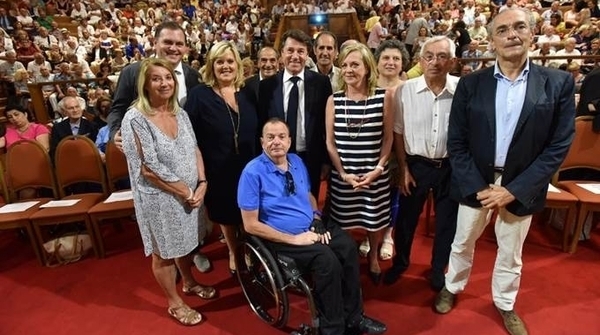The commemorative day of July 5, 1962*, was an occasion to pay tribute to the victims with the pre-screening of the film “Oran, the Forgotten Massacre” at the CUM.
This screening was followed by a round table discussion hosted by Georges-Marc Benamou, producer, Jean-Jacques Jordi, historian and writer, Jean Monneret, historian and writer, Jean-Noël Pancrazi, writer, and Suzy Simon-Nicaise, National Vice President of the Cercle Algérianiste.
The massacre of July 5, 1962, in Oran, is a massacre of Europeans that occurred three and a half months after the ceasefire of the Algerian War.
- It was perpetrated by armed Algerian elements against European civilians (the estimated death toll is disputed: between 600 and 3000). Muslim victims were also reported.
-
However, the barbarity of this mass massacre, which remained unpunished and was probably premeditated to scare and hasten the departure of Europeans, is hardly contestable.
-
The French armed forces waited several hours before intervening.
-
Unlike the repression of the FLN demonstration in Paris on October 17, 1961 (and like the Rue d’Isly Massacre on March 26, 1962), France has never acknowledged its responsibility, even though it was, over a very short period, the largest massacre of the Algerian War.
The context
- Following the Évian Accords of March 18, 1962, the self-determination referendum took place on July 1.
-
On July 5, there were about 100,000 Europeans remaining in Oran. In principle, they received personal protection guarantees from the Évian Accords. From the early morning, a crowd poured in from Arab neighborhoods to European ones, from Place Kargentah to Place d’Armes, “for a peaceful parade.”
-
At 11 a.m., a gunshot, which could be a sign, rang out. It was the beginning of a slaughter: a wild and systematic hunt for Europeans began throughout the city. The first kidnappings were reported around 12:10 p.m.
The reaction of the French army
18,000 men of the French army were present in Oran City. For De Gaulle, “France must no longer have any responsibility in maintaining order after self-determination.”
- General Katz commanded Oran. He did not react until the early afternoon, probably to avoid displeasing the political power. At 12:15, he recalled that the troops were confined.
-
He always maintained that the French Government, and not him, was responsible for the army’s inaction since the responsibility for maintaining order had been removed from him.
Honor was saved by isolated initiatives
- Captain Croguennec freed more than 400 people from the central police station at 2 p.m. and sheltered them in his camp at the Jules Ferry school.
-
Lieutenant Rabah Kheliff commanded the 4th company of the 30th BCP. He saved hundreds of Europeans.
The response of the Algerian authorities
- The new prefect Lahouari Souyah presented 58 Muslim prisoners to the media, arrested the previous day at Petit-Lac. He accused them of all the crimes committed. A version no one in Oran believed, even among Muslims.
The consequences for the European population
- This massacre completed the terrorization of the European civilian population. It showed them that they were deprived of protection. By October 1962, only two hundred thousand Pieds-Noirs remained in Algeria, down from about a million the previous year.
The number of victims
- Official figures of the time reported 25 deaths.
-
Repatriate associations speak of “3,000 missing” in Oran that day.
-
Jean-Pierre Chevènement, interim prefect of Oran, cited the number of 807 victims provided by his services.
-
In 2010, Jean Monneret considered it “reasonable, taking all evaluations into account,” to estimate that the scale of the European victims on July 5, 1962, in Oran was “between 400 and 600.”
The refusal of France to recognize the massacre and its responsibility
The Republic consistently refuses to acknowledge its responsibility for the massacre. On April 20, 2015, Jean-Marc Todeschini, Secretary of State for Veterans and Memory, visiting Algiers, described the massacre as “tragic excesses,” thus renewing the denial.


